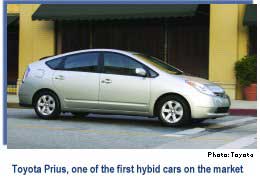|
Hybrids Worth the Hype
By Mary Kelley Hoppe
 Welcome to the new world: high-performance cars with cleaner emissions, sleek digital displays tucked under the windshield peddling speed and fuel efficiency data, and motors so quiet you have to remind yourself they're running. Welcome to the new world: high-performance cars with cleaner emissions, sleek digital displays tucked under the windshield peddling speed and fuel efficiency data, and motors so quiet you have to remind yourself they're running.
Demand for new hybrid cars, combining smaller gas engines with electric motors that recharge as you drive, is rising faster than the industry's ability to produce them.
Gone is the 'vroom-vroom' but so is the plug-in requirement that relegated electric cars - once hailed as the car of the future - to the back bin. When Toyota introduced Prius to the U.S. market in 2000, the automaker estimated sales of 12,000 units. To date, Toyota has sold more than 97,000 and local dealers can't keep the new Prius on the lot long enough for the curious and adoring to take it for a test drive. Customer waits for buying a hybrid are a year.
Nationally, over 85,000 hybrid cars are likely to be sold this year, according to research firm J.D. Power and Associates. And the list of models is growing, with a new batch of hybrid sport utility vehicles - led by the Ford Escape - rolling into Tampa Bay showrooms by the end of the year.
|
 How hybrids work How hybrids work
Hybrid cars are powered by a smaller, fuel-efficient gas engine that works in tandem with a sophisticated electric motor. Essentially, the electric motor helps power the car in idle and during acceleration, while the gas engine kicks in when the car is cruising. The gas engine powers the drive-train and helps recharge the electric motor's battery when the car decelerates. A computer optimizes how much you use the electric motor versus the internal combustion engine. Newer versions are both responsive and smooth.
Oddly enough, hybrids actually outperform their conventional cousins in city traffic. That's because the electric motor is providing more of the power in those demanding driving situations. So hybrids should appeal most to city dwellers driven to distraction.
|
|
|
While hybrid fuel economy under actual conditions may not match EPA sticker ratings, it's impressive nonetheless and drivers need no longer sacrifice performance.
Just ask Prius enthusiast Martha Garcia. "It's very sporty, and very smooth," Garcia says of the 2004 model she drives at work for Tampa BayWatch in St. Petersburg. She also owns a 2003 Prius that averages 45 miles per gallon and 35 to 40 mpg during summer months when the AC is cranking. The newer Prius gets about 55 mpg year round now that the AC runs entirely off of the electric motor.
With higher gas prices, growing disdain for U.S. reliance on foreign oil, and declining hybrid technology costs, hybrids will only continue to gain in popularity. That's good news for Tampa Bay as air pollution - and associated car and truck emissions - continues to rise on the bay's radar screen.
|
 But does it pay to switch? But does it pay to switch?
Hybrid cars typically cost anywhere from $3,000 to $5000 more than their conventional counterparts, but the price spread continues to narrow, fuel savings are significant - and let's not forget: you'll breathe easier!
Maintenance and insurance costs are comparable.
|
|
On deck for release in 2005 are no fewer than five hybrids, from luxury SUVS to a ram-tough pickup truck. Newcomers include hybrid versions of the popular Toyota Highlander SUV, Lexus 330 SUV, Honda V6 sedan, Saturn hybrid, and DaimlerChrysler's Dodge Ram pick up truck.
As many as 20 hybrid models will be cruising the roads in 2006 when hybrid sales are expected to zoom past the quarter-million unit mark.
Lest you think the future is here, some prognosticators are already barreling down the road to the next generation of automotive technology - hydrogen fuel cells (see related story).
"It's on everybody's radar screen who knows even a little bit about cars," says David Trachtenberg of Tampa's Precision Toyota. "It's just an issue of (creating) the new fueling infrastructure." |

